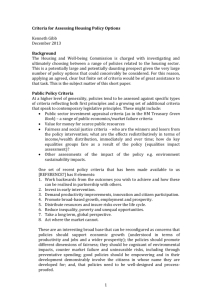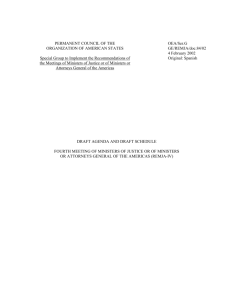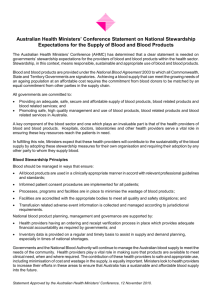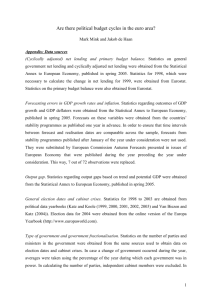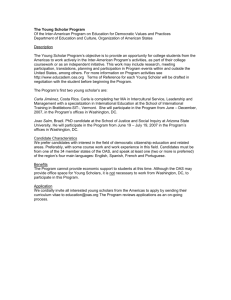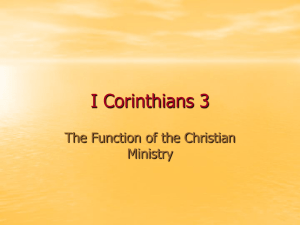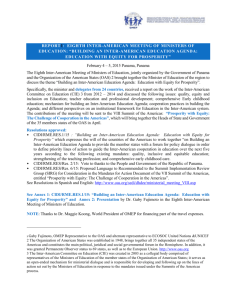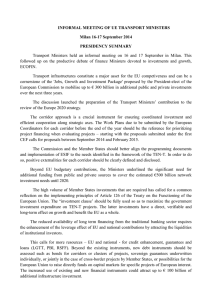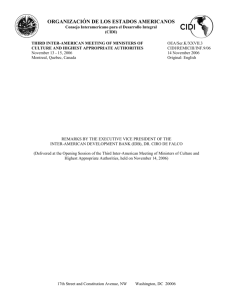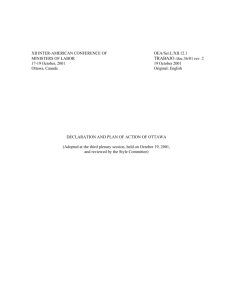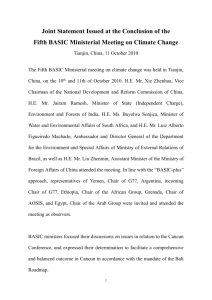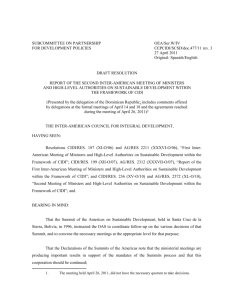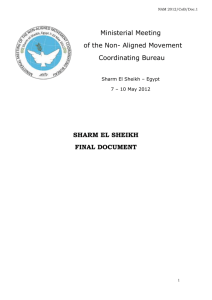xlv meeting of the summit implementation
advertisement
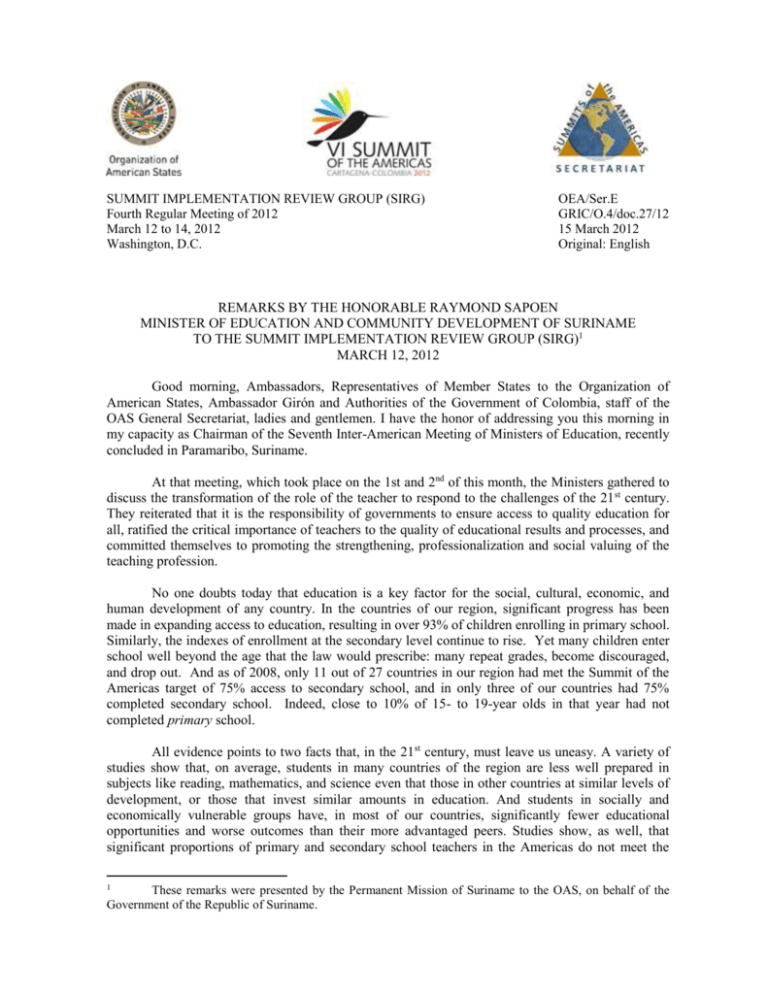
SUMMIT IMPLEMENTATION REVIEW GROUP (SIRG) Fourth Regular Meeting of 2012 March 12 to 14, 2012 Washington, D.C. OEA/Ser.E GRIC/O.4/doc.27/12 15 March 2012 Original: English REMARKS BY THE HONORABLE RAYMOND SAPOEN MINISTER OF EDUCATION AND COMMUNITY DEVELOPMENT OF SURINAME TO THE SUMMIT IMPLEMENTATION REVIEW GROUP (SIRG)1 MARCH 12, 2012 Good morning, Ambassadors, Representatives of Member States to the Organization of American States, Ambassador Girón and Authorities of the Government of Colombia, staff of the OAS General Secretariat, ladies and gentlemen. I have the honor of addressing you this morning in my capacity as Chairman of the Seventh Inter-American Meeting of Ministers of Education, recently concluded in Paramaribo, Suriname. At that meeting, which took place on the 1st and 2nd of this month, the Ministers gathered to discuss the transformation of the role of the teacher to respond to the challenges of the 21 st century. They reiterated that it is the responsibility of governments to ensure access to quality education for all, ratified the critical importance of teachers to the quality of educational results and processes, and committed themselves to promoting the strengthening, professionalization and social valuing of the teaching profession. No one doubts today that education is a key factor for the social, cultural, economic, and human development of any country. In the countries of our region, significant progress has been made in expanding access to education, resulting in over 93% of children enrolling in primary school. Similarly, the indexes of enrollment at the secondary level continue to rise. Yet many children enter school well beyond the age that the law would prescribe: many repeat grades, become discouraged, and drop out. And as of 2008, only 11 out of 27 countries in our region had met the Summit of the Americas target of 75% access to secondary school, and in only three of our countries had 75% completed secondary school. Indeed, close to 10% of 15- to 19-year olds in that year had not completed primary school. All evidence points to two facts that, in the 21st century, must leave us uneasy. A variety of studies show that, on average, students in many countries of the region are less well prepared in subjects like reading, mathematics, and science even that those in other countries at similar levels of development, or those that invest similar amounts in education. And students in socially and economically vulnerable groups have, in most of our countries, significantly fewer educational opportunities and worse outcomes than their more advantaged peers. Studies show, as well, that significant proportions of primary and secondary school teachers in the Americas do not meet the 1 These remarks were presented by the Permanent Mission of Suriname to the OAS, on behalf of the Government of the Republic of Suriname. -2- official national requirements to teach at those levels. The implications for all of our aspirations regarding the reduction of poverty and inequality and the assurance of a good quality of life for all our citizens are clear. It is not enough to speak about the importance of quality education. If we are serious about reaching our goals, our educational systems require urgent attention. Ministers in Paramaribo learned from a recent study in eight of our countries that there is a lack of comprehensive educational policies to prepare, attract, develop, motivate, compensate, and retain teachers; that levels of investment are irregular; and, that there are insufficient opportunities for participation and dialogue among education system stakeholders. On the other hand, those educational systems in the world that have the best learning outcomes have in place coherent policies to recruit the best prepared candidates into teaching, prepare them well throughout their careers, and guarantee appropriate support mechanisms for them. The Ministers recognized that policies to strengthen the teaching profession and opportunities for quality professional development are vital to attract, employ, induct, develop, evaluate, motivate, retain, and recognize teachers. They pledged to promote the strengthening, professionalization and social valuing of the teaching profession. The meeting of Ministers discussed the importance of expanding access to Information and Communication Technologies (ICTs) in education at all levels and in all sectors, as a contributing factor in the preparation of students, their learning, and their active and democratic participation in the political, social, cultural, and productive arenas. Recognizing that research consistently shows that access to technology will not automatically result in improved learning outcomes, ministers agreed that expanding access to ICTs must be accompanied by investments in well-considered policies and programs to prepare teachers, especially, to incorporate the technology into their teaching in ways that promote and reinforce learning. The Ministers in Paramaribo emphasized the importance of training teachers to use these tools effectively in the teaching and learning process. The Ministers emphasized their need for horizontal cooperation to increase the exchange of successful and unsuccessful policies and practices and to avoid reinventing the wheel. They pledged to use mechanisms available through the OAS, including the Inter-American Teacher Education Network (ITEN), to promote information exchange, capacity building, and horizontal cooperation through virtual seminars (webinars), online courses for 21st century skills, and technical assistance, to advance member state efforts to strengthen teaching and learning. Among the conclusions of the Ministerial Meeting were the intent to use and expand this existing OAS network to create a bank of innovative policies, practices, and programs for initial preparation of teachers, their professional development, the improvement of their working conditions, and the effective incorporation of ICTs into teaching practice. Additional financial support to the Network was offered in order to help make this possible. On other topics, Ministers strongly endorsed the critical importance of increasing the coverage of quality comprehensive early childhood education in each member state in accordance with its circumstances, thus reiterating their historic 2007 Hemispheric Commitment to Early Childhood Education.. Finally, they gave a vote of confidence to the Inter-American Program on Education for Democratic Values and Practices, and renewed their commitment to this program, which seeks to strengthen a culture of democracy and peace through education. -3- The Declaration of Paramaribo was approved with the title “Transforming the role of the teacher in response to 21st-century challenges.” reiterating that it is the responsibility of governments to ensure access to quality education for all. The declaration emphasizes the intrinsic value of education, its social function, and its impact on the quality of life of every person and community. It ratifies the fundamental role of the teacher in educational processes and results and commits the Ministers to promoting the strengthening, professionalization and social value of the teaching profession. Today, I offer the Declaration of Paramaribo for your consideration as you finalize negotiations on the documents to be adopted by our Heads of State and Government at the Sixth Summit of the Americas next month in Cartagena. Ladies and Gentlemen, I humbly offer for your consideration the conclusions of the Ministers of Education of the Americas as you debate how the documents to be adopted by the Heads of State and Government will lead toward the vision of the Summit’s theme – “connecting the Americas, partners for prosperity.” Toward that end, my delegation will be pleased to put at your disposal a few concrete suggestions, based on the Declaration of Paramaribo, for the issue papers on Poverty and Inequality, and Access to and Use of Information and Communications Technologies. Ladies and gentlemen, education in the region faces challenges that are of great magnitude and urgency. Addressing these challenges successfully will, as the VII Meeting of Ministers of Education concluded, have an impact the quality of life of every person and community, strengthen economies, foster social inclusion and mobility, promote poverty reduction, and build citizenship and identity throughout the Americas. I thank you very much for this opportunity to address you today and wish you every success in your deliberations. cmbrs00974e01
